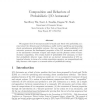241 search results - page 3 / 49 » Learning Classes of Probabilistic Automata |
ALT
2010
Springer
15 years 3 months ago
2010
Springer
Known algorithms for learning PDFA can only be shown to run in time polynomial in the so-called distinguishability
149
Voted
CONCUR
1994
Springer
15 years 5 months ago
1994
Springer
We augment the I/O automaton model of Lynch and Tuttle with probability, as a step toward the ultimate goal of obtaining a useful tool for specifying and reasoning about asynchron...
120
click to vote
FMCO
2006
Springer
15 years 5 months ago
2006
Springer
In this paper, we give an overview on some algorithms for learning automata. Starting with Biermann's and Angluin's algorithms, we describe some of the extensions caterin...
112
click to vote
COLT
1994
Springer
15 years 5 months ago
1994
Springer
We propose and analyze a distribution learning algorithm for variable memory length Markov processes. These processes can be described by a subclass of probabilistic nite automata...
118
click to vote
QEST
2008
IEEE
15 years 8 months ago
2008
IEEE
In [3] a probabilistic semantics for timed automata has been defined in order to rule out unlikely (sequences of) events. The qualitative model-checking problem for LTL propertie...

